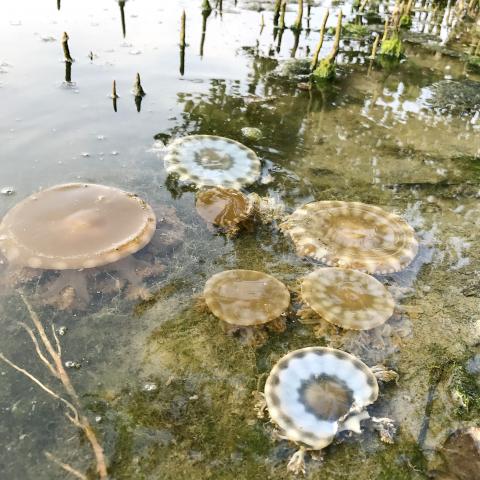Kaohsiung’s Marine Wetlands Park in the city’s Linyuan District (林園) yesterday announced that upside-down jellyfish, once the main attraction of its coastal lagoons, have returned.
The upside-down jellyfish did not appear in the park’s lagoons between 2016 and last year because industrial waste was dumped into the lagoons, park officials said.
The wetlands park once had the only lagoon where up to 10,000 jellyfish would congregate, the park said, adding that many former school children undoubtedly have fond memories of their field trips to the area.

Photo: Hung Chen-hung, Taipei Times
However, industrial pollution drove away the jellyfish and caused a drastic drop in the number of visitors, the park said.
The Linyuan District Mangrove Conservation Society, which works with the park, is now taking reservations for group tours, society director-general Su Wen-hua (蘇文華) said.
“According to our observations, the number of jellyfish is at its lowest from June to August and slowly increases starting each September,” Su said.
January and February are the creatures’ breeding season and the best period for observing the jellyfish, Su added.
Outside the park, jellyfish have also been spotted in ditches in the district’s Gangpu (港埔) and Shanwei (汕尾) areas and there have been sightings of sea anemones, Su said.
This is due to pumps drawing in the jellyfish and sea anemones when local aquaculture farmers are piping in saltwater for their ponds, Su said.
A thicker layer of sediment at the bottom of the lagoons could be one of the reasons why the population of jellyfish cannot compare with its peak of 10,000, Su said.
The number of fish in the lagoons and the sediment kicked up when fish swim around is also not conducive to the growth of jellyfish, Su said.
His organization hopes to work with the park to create a suitable habitat for the jellyfish, Su said, adding that one method would be to artificially change the direction of the current to wash away the sediment.
The mangrove society and the park would also call for volunteers to regularly clean the algae off the lagoon’s surface to help photosynthesis inside the jellyfish, Su said.

Taiwanese can file complaints with the Tourism Administration to report travel agencies if their activities caused termination of a person’s citizenship, Mainland Affairs Council Minister Chiu Chui-cheng (邱垂正) said yesterday, after a podcaster highlighted a case in which a person’s citizenship was canceled for receiving a single-use Chinese passport to enter Russia. The council is aware of incidents in which people who signed up through Chinese travel agencies for tours of Russia were told they could obtain Russian visas and fast-track border clearance, Chiu told reporters on the sidelines of an event in Taipei. However, the travel agencies actually applied

Japanese footwear brand Onitsuka Tiger today issued a public apology and said it has suspended an employee amid allegations that the staff member discriminated against a Vietnamese customer at its Taipei 101 store. Posting on the social media platform Threads yesterday, a user said that an employee at the store said that “those shoes are very expensive” when her friend, who is a migrant worker from Vietnam, asked for assistance. The employee then ignored her until she asked again, to which she replied: "We don't have a size 37." The post had amassed nearly 26,000 likes and 916 comments as of this

New measures aimed at making Taiwan more attractive to foreign professionals came into effect this month, the National Development Council said yesterday. Among the changes, international students at Taiwanese universities would be able to work in Taiwan without a work permit in the two years after they graduate, explainer materials provided by the council said. In addition, foreign nationals who graduated from one of the world’s top 200 universities within the past five years can also apply for a two-year open work permit. Previously, those graduates would have needed to apply for a work permit using point-based criteria or have a Taiwanese company

The Shilin District Prosecutors’ Office yesterday indicted two Taiwanese and issued a wanted notice for Pete Liu (劉作虎), founder of Shenzhen-based smartphone manufacturer OnePlus Technology Co (萬普拉斯科技), for allegedly contravening the Act Governing Relations Between the People of the Taiwan Area and the Mainland Area (臺灣地區與大陸地區人民關係條例) by poaching 70 engineers in Taiwan. Liu allegedly traveled to Taiwan at the end of 2014 and met with a Taiwanese man surnamed Lin (林) to discuss establishing a mobile software research and development (R&D) team in Taiwan, prosecutors said. Without approval from the government, Lin, following Liu’s instructions, recruited more than 70 software